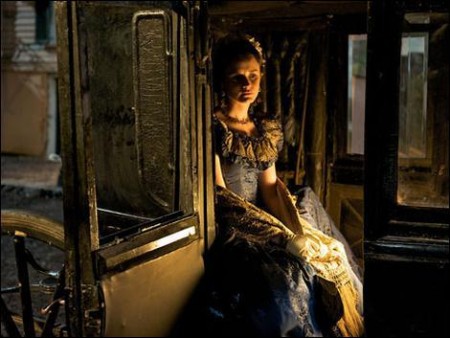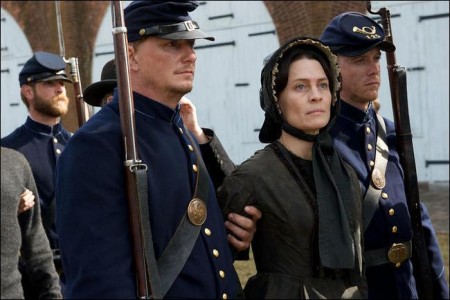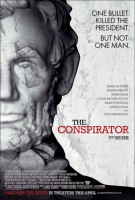Taglines: One bullet killed the President. But not one man.
Against the turbulent backdrop of post-Civil War Washington, rookie lawyer Frederick Aiken (James McAvoy) reluctantly agrees to defend Mary Surratt (Robin Wright Penn) – the lone woman charged as a co-conspirator in the assassination trial of Abraham Lincoln. When his colleagues, friends, and true love begin to desert him, Aiken must rely on Mary’s spirited daughter Anna (Evan Rachel Wood) to help piece together the events leading up to the assassination.
Facing down the government he fought so heroically to defend, Aiken quickly realizes Mary may be innocent and that she is being used as bait in order to capture the only conspirator to have escaped the massive manhunt: her own son, John. Unwilling to incriminate her boy, Mary refuses to cooperate as Aiken seeks to defend her by building his case against John. With time running out, Aiken puts everything on the line in order to convince a bloodthirsty nation – and Mary, herself – to do what is right. But will this be enough to prevent the U.S. government and its people from flouting principle and exacting revenge?
A Shocking Act of Violence
The Conspirator explores the national reaction to Lincoln’s assassination in the aftermath of what was, at the time, the most shocking murder in U.S. History. Director Robert Redford, states, “The film deals with the harsh efforts to keep the political polarization of the time from worsening. The country was deeply divided, not just North and South, but also between those in government who wanted to place post-war punishments and restrictions on the defeated South that would cause suffering and resentment among the Confederates and those, like Lincoln, who wanted a more moderate, conciliatory reconstruction.
Producer Brian Falk says he and The American Film Company were intrigued by Booth’s misguided efforts “to decapitate the federal government. This is one of those stories that everybody thinks they know, but it really is a story that nobody knows. Everybody understands that Abraham Lincoln was killed by an actor named John Wilkes Booth. What they don’t know is that it’s part of this much larger, more complex conspiracy.
The Conspirator tells the story of Mary Surratt who was the only woman charged in the conspiracy to kill Abraham Lincoln. The conspirators, including Mary’s son, John, met at her boardinghouse and some of them roomed there. Had they discussed the assassination during those meetings? Did Mary know? Did she conspire with them? Even today, we don’t know. The scriptwriter, James Solomon, is sure the prosecution thought she was guilty.
“There’s no question in my mind that Edwin Stanton, the Secretary of War, and Joseph Holt, the Judge Advocate General thought she was guilty and there’s no question in my mind that her defense lawyer, Frederick Aiken, thought she was innocent. Perhaps the truth is somewhere between both points of view and I think that’s sort of where I would like it to be, because the ambiguity is the most truthful.
The film’s director, Robert Redford, elaborates, “The Conspirator concerns more than one conspiracy. There was the assassination, of course, but there was also a conspiracy of political expediency. Stanton, as Secretary of War and one of Lincoln’s closest advisors, was a powerful force in government. While the others in the administration were stunned and in mourning, and with Secretary of State Seward gravely injured, Stanton took control of investigating the crime and prosecuting the conspirators.
As Redford observes, “Everyone knew the recent surrender ending the war represented a tenuous peace, at best. The assassination was a direct threat to that peace… Stanton quickly dealt with this threat by devising an immediate, final and cathartic solution. He took shortcuts to do that and was able to persuade legal and military leaders to support his efforts. Stanton’s efforts took the form of a quick military tribunal and immediate execution. Clearly, he was intending to publicly avenge Lincoln’s death, make the Union more secure, and move the nation beyond this tragic event.
The Emotional Core
Behind the conspiracies and the political machinations, according to Solomon, beats the emotional heart of the film: the story of a mother and a son. “ Here is a mother in a desperate situation essentially abandoned by her son. Another young man steps in and becomes a surrogate son to this mother. He stays and fights to the very end while her own son doesn’t come to defend or rescue her.
That surrogate son is Frederick Aiken, a young, decorated Union war hero just beginning his career as an attorney. He reluctantly represents Mary and comes to passionately fight for her within a system bent on executing Mary Surratt, and her co-defendants.
“In The Conspirator, Redford says, “events trigger an emotional struggle in both Mary and Aiken that challenge their conceptions of duty, honor and loyalty. How they respond to those challenges creates this compelling story.
Solomon agrees,“It’s astory about allegiances and loyalties anddividedloyalties. Aiken,a Union captain with an allegiance to Lincoln and the northern cause for which he fought valiantly, works with Reverdy Johnson (Tom Wilkinson), a southern senator and attorney who was forced, like all southerners, to take a hated loyalty oath after the war. Aiken admires his mentor and understands his duty as a lawyer, but struggles at first with his own distaste for the alleged assassins. As he delves further into Mary’s case, he finds his loyalties further divided andsuffers the disapproval of the community and his closest friends. He meets his match in Mary, a mother holding fast her allegiance to her family and, perhaps, the southern cause.
Finding History
The Conspirator is The American Film Company’s first feature. Joe Ricketts, the founder of Ameritrade and whose family owns the Chicago Cubs, established the company in 2008 to produce engaging, historically accurate films from America’s storied past. “Real life is often more compelling than fiction, says Ricketts.
From Solomon’s perspective, “This movie came about because Joe Ricketts created The American Film Company. TAFC doesn’t treat historical stories like distant relics. “TAFC knows these stories have tremendous relevancy and resonance with the present, adds Solomon.
Remarks Falk, “The script for The Conspirator had been around Hollywood for a long time. Someone had seen it and thought we should read it. I honestly felt it was probably the single best unproduced script I had ever read.
This is just the kind of story TAFC was created to make. Webster Stone, the third member of The American Film Company’s executive team, notes that the company will continue to choose from a wide range of historical stories and they plan to explore diverse areas and eras. Falk agrees, stating, “I think that it’s not just that truth is stranger than fiction. I think in a lot of ways truth is better than fiction.
The American Film Company knew this project was going to need a very special director. “It required somebody passionate about history and the American story, says Falk. “We thought there was little opportunity to even reach out to a director of Robert Redford’s caliber, but true to how compelling and interesting this story is, Bob read it and responded so positively that it set in motion the plan to get this film made. In fact, Redford only took four days to read the script and request a meeting.
“The American Film Company came to me because of my experience with the kind of filmmaking they wanted to do. Not just as an actor in films like All the President’s Men and Butch Cassidy and The Sundance Kid, but also as the director of Quiz Show and producer of The Motorcycle Diaries and A Civil Action, Redford found The American Film Company to be a natural pairing. “History is a source of great stories that often seem to relate to where we are today, says Redford, “Even more interesting, once you immerse yourself in a bit of history, you find the accepted narrative isn’t always the real story. There is usually another story beneath the one you’ve been told or the one you think you know.
In early 2009, with Redford on board, everyone wanted to get right to work. Though it was already spring, Redford wanted to try to finish the film before the end of the year. Jeremiah Samuels heard about the movie at the end of July. He read it quickly and just as quickly committed to it. “It’s such an incredible piece of material and even though we had a really short amount of time, I said I’d love to do it. One day at Redford’s Wildwood Entertainment office, Executive Producer Samuels remembers Redford asking him if he thought the schedule was feasible. “Bob said to me, ‘Do you think you can get this movie together in the time that we’ve got?’ and I said I was pretty sure we could, but told him we can’t make any false steps. From that moment on,we’ve beenin a dead run andit’s been ablur.
“Everybody in the room saw no reason to delay, remembers Falk, “We didn’t have everyone on the cast in place when we started, but we were able to play the odds a bit because everybody was so passionate about this project. Still,headds,“the biggestchallenge wassetting upa period piece intheshortamount oftime we had to recreate a world that no longer exists.
The Conspirator
Directed by: Robert Redford
Starring by: Norman Reedus, James McAvoy, Robin Wright, Evan Rachel Wood, Alexis Bledel, Colm Meaney, Kevin Kline, Toby Kebbell
Screenplay by: Gregory Bernstein, James D. Solomon
Production Design by: Kalina Ivanov
Cinematography by: Newton Thomas Sigel
Film Editing by: Craig McKay
Costume Design by: Louise Frogley
Set Decoration by: Melissa M. Levander
Art Direction by: Mark Garner
Music by: Mark Isham
MPAA Rating: PG-13 for some violent content.
Studio: Roadside Attractions
Release Date: April 15, 2011
Hits: 43





